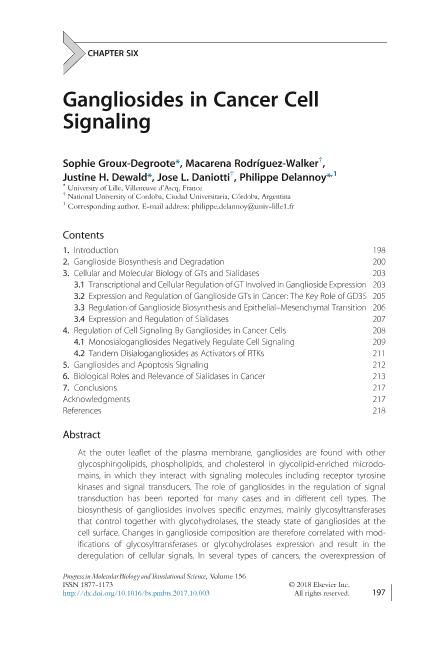Mostrar el registro sencillo del ítem
dc.contributor.author
Groux-Degroote, Sophie
dc.contributor.author
Rodríguez Walker, Macarena

dc.contributor.author
Dewald, Justine H.
dc.contributor.author
Daniotti, Jose Luis

dc.contributor.author
Delannoy, Philippe
dc.date.available
2020-01-22T21:13:10Z
dc.date.issued
2018-01
dc.identifier.citation
Groux-Degroote, Sophie; Rodríguez Walker, Macarena; Dewald, Justine H.; Daniotti, Jose Luis; Delannoy, Philippe; Gangliosides in Cancer Cell Signaling; Elsevier B.V.; Progress in Molecular Biology and Translational Science; 156; 1-2018; 197-227
dc.identifier.issn
0079-6603
dc.identifier.uri
http://hdl.handle.net/11336/95629
dc.description.abstract
At the outer leaflet of the plasma membrane, gangliosides are found with other glycosphingolipids, phospholipids, and cholesterol in glycolipid-enriched microdomains, in which they interact with signaling molecules including receptor tyrosine kinases and signal transducers. The role of gangliosides in the regulation of signal transduction has been reported for many cases and in different cell types. The biosynthesis of gangliosides involves specific enzymes, mainly glycosyltransferases that control together with glycohydrolases, the steady state of gangliosides at the cell surface. Changes in ganglioside composition are therefore correlated with modifications of glycosyltransferases or glycohydrolases expression and result in the deregulation of cellular signals. In several types of cancers, the overexpression of disialogangliosides, such as GD3 or GD2 mainly results in the activation of cell signaling, increasing cell proliferation and migration, as well as tumor growth. In this chapter, we summarize our current knowledge of ganglioside biosynthesis, degradation, and of their role in cell signaling regulation in cancers.
dc.format
application/pdf
dc.language.iso
eng
dc.publisher
Elsevier B.V.

dc.rights
info:eu-repo/semantics/openAccess
dc.rights.uri
https://creativecommons.org/licenses/by-nc-sa/2.5/ar/
dc.subject
APOPTOSIS
dc.subject
CANCER
dc.subject
CELL SIGNALING
dc.subject
GANGLIOSIDE
dc.subject
RECEPTOR TYROSINE KINASE
dc.subject
SIALIDASE
dc.subject
SIALYLTRANSFERASE
dc.subject.classification
Bioquímica y Biología Molecular

dc.subject.classification
Ciencias Biológicas

dc.subject.classification
CIENCIAS NATURALES Y EXACTAS

dc.title
Gangliosides in Cancer Cell Signaling
dc.type
info:eu-repo/semantics/article
dc.type
info:ar-repo/semantics/artículo
dc.type
info:eu-repo/semantics/publishedVersion
dc.date.updated
2019-10-22T16:38:05Z
dc.identifier.eissn
1878-0814
dc.journal.volume
156
dc.journal.pagination
197-227
dc.journal.pais
Países Bajos

dc.journal.ciudad
Amsterdam
dc.description.fil
Fil: Groux-Degroote, Sophie. Universite Lille; Francia
dc.description.fil
Fil: Rodríguez Walker, Macarena. Consejo Nacional de Investigaciones Científicas y Técnicas. Centro Científico Tecnológico Conicet - Córdoba. Centro de Investigaciones en Química Biológica de Córdoba. Universidad Nacional de Córdoba. Facultad de Ciencias Químicas. Centro de Investigaciones en Química Biológica de Córdoba; Argentina
dc.description.fil
Fil: Dewald, Justine H.. Universite Lille; Francia
dc.description.fil
Fil: Daniotti, Jose Luis. Consejo Nacional de Investigaciones Científicas y Técnicas. Centro Científico Tecnológico Conicet - Córdoba. Centro de Investigaciones en Química Biológica de Córdoba. Universidad Nacional de Córdoba. Facultad de Ciencias Químicas. Centro de Investigaciones en Química Biológica de Córdoba; Argentina
dc.description.fil
Fil: Delannoy, Philippe. Universite Lille; Francia
dc.journal.title
Progress in Molecular Biology and Translational Science

dc.relation.alternativeid
info:eu-repo/semantics/altIdentifier/doi/https://doi.org/10.1016/bs.pmbts.2017.10.003
dc.relation.alternativeid
info:eu-repo/semantics/altIdentifier/url/sciencedirect.com/science/article/pii/S1877117317301400
Archivos asociados
